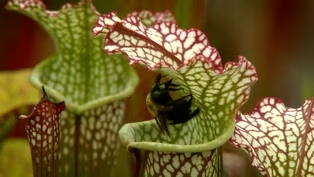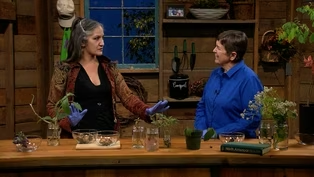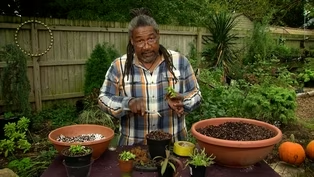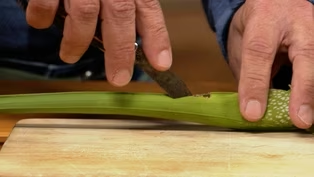Virginia Home Grown
Plants that can be Toxic to Pets
Clip: Season 25 Episode 8 | 7m 36sVideo has Closed Captions
Learn about common and uncommon plants with toxic properties
Serome Hamlin meets Jeff Minnich at his private garden to talk about why pet owners should be aware of the toxic plants in their gardens. Featured on VHG episode 2508, October 2025.
Problems playing video? | Closed Captioning Feedback
Problems playing video? | Closed Captioning Feedback
Virginia Home Grown is a local public television program presented by VPM
Virginia Home Grown
Plants that can be Toxic to Pets
Clip: Season 25 Episode 8 | 7m 36sVideo has Closed Captions
Serome Hamlin meets Jeff Minnich at his private garden to talk about why pet owners should be aware of the toxic plants in their gardens. Featured on VHG episode 2508, October 2025.
Problems playing video? | Closed Captioning Feedback
How to Watch Virginia Home Grown
Virginia Home Grown is available to stream on pbs.org and the free PBS App, available on iPhone, Apple TV, Android TV, Android smartphones, Amazon Fire TV, Amazon Fire Tablet, Roku, Samsung Smart TV, and Vizio.
Providing Support for PBS.org
Learn Moreabout PBS online sponsorship>>I'm a landscape designer and horticulturist.
When it was time to retire... >>Did we ever retire?
>>Right, I still haven't completely retired, but when it was time to open the next chapter, I guess, we decided to move to Richmond and picked here in Forest Hill, and we absolutely love it.
But the wonderful thing is, aside from the great house, it's a flat, sunny garden.
I can have vegetables, I also have some wonderful trees, and I can have a wonderful shade garden.
And I'm a plant collector, and I'm also a zone pusher, which, of course, you know means that you try to grow things that aren't supposed to be hardy in this area.
And I've had a lot of surprises.
I think there are things here that I never would've dreamed would've thrived here, but they are thriving.
>>Yes, and then as I look around, we're gonna be talking about plants that could be poisonous or detrimental to our four-legged canine friends.
And most people think about tropical plants, but we don't really think about the common plants that we use in our everyday gardens that we love using and them being harmful.
>>Hostas, for instance, have some poisonous aspects to them, and arum lilies, which have a beautiful foliage in the winter, and then berries in the spring.
I would think that the fruit produced on plants would be probably the most interesting thing to animals to play with, maybe intriguing to them or-- >>It could look like a toy.
>>Yes.
But when we've had dogs here, it's mostly they just are wandering around, sniffing to get a feel for the place.
>>So you said you were a zone pusher, and with the climate change happening now, and that it's making it more and more easier to push the zones, you can say, for a lot of these plants that we couldn't grow years ago.
But just in our lifespan, we're noticing that they're becoming more and more hardy here.
For instance, the sago palm is starting to be able to survive some of our winters.
>>You know, the sago's leaves are a little bit on the prickly side, and the interior where the seeds form has little thorns.
So it is hard to get the seeds out.
Here we really don't have the problem with the seeds because we don't have a long enough season.
It's just not a long enough season to really get the seeds.
>>Yeah.
>>And so that's not really a problem, but they are known to be poison.
>>Yes, and you'll wonder why a dog will go after a particular plant or a berry, and it's no real reason I guess I should say.
They could think of it as a play toy or there's a certain scent that attracts them to 'em even though they're not supposed to eat it.
And it differs from dog to dog.
So you can't just say one species is going to do something over another or one dog over another.
But just like you, I personally don't garden thinking about what they may or may not go after.
>>Yes, and we do have a six and a half foot fence, solid fence around our backyard.
So that keeps most animals out.
I would say the raccoons and the squirrels and other wild animals do get in, but our domestic friends can't get in, unless they're invited in.
Now, the jade plant here, we do take in in the winter.
I will say that inside, particularly with cats, I would be more concerned about having some of these tropical things that come out for the summer.
>>For sure.
>>Yeah.
>>And I would definitely be a lot more aware of what I have inside the house for the winter.
>>Do you mind showing us around your garden, and we can see what else we can find that may be poisonous or detrimental to our four-legged friends?
>>Sure thing.
Let's go.
(water sploshing) >>Wow, what a nice combination you have here, Jeff, with the coleus and the Begonia.
>>Well, thank you, and this really was serendipitous because I had hoped that putting this color coleus against this wonderful old brick wall would look good.
But I wasn't sure it would get quite enough light to really bring the color out.
And it did.
It was one of those surprise-- >>Yes.
>>You know, combos.
And as you said earlier, the coleuses and begonias-- >>And begonias, both are poisonous.
>>Yes.
Around the corner here, we do have a lantana, a hardy lantana.
And what was the name of that again?
It was it... >>It was Miss Huff.
>>Miss Huff, right.
>>Miss Huff.
>>And it does come back every year.
>>And then the beautiful juniper.
>>Yes, and thank goodness we have this here.
It keeps the hot summer sun off.
>>Right, exactly.
I really love this variegated Kousa dogwood and the Spanish moss.
>>Oh yeah, yeah, the Spanish moss.
We get that when we're down south.
But, you know, even in Virginia Beach, in Seashore State Park, it grows.
>>It grows.
>>I think that might be the northern limit of it.
>>Oh, and I see we have a holly here, which is another plant that is commonly used in landscapes that could be detrimental to dogs.
>>Yes.
>>I love this wall of osmanthus bringing us into another room here.
>>Oh, I'm glad you said room.
That was the effect that I was hoping for.
>>I love your veggie beds, and I see you got a row of peonies here.
Peonies again is on our list.
And as far as veggies, we've gotta really watch out for certain things like tomatoes and onions for keeping our dogs from eating those.
And now look at this beautiful dahlia against this red wall.
>>Yes.
>>It's beautiful.
>>Full of pollinators, isn't it?
>>Yes.
I see it's really buzzing with life.
>>Yes, it is.
>>And again, it's on our list of poisonous plants.
>>I have one more area I wanna show you.
>>Oh, I'm excited to see.
>>Come on along.
>>Wow, what a tropical-looking area you got back here.
This is incredible.
>>It is really pretty and very dramatic.
And this is one of our favorite corners of the garden.
>>Castor beans, again, it is a poisonous plant, but what a dramatic effect it gives back here.
>>Yes.
And we do have it contained within our high fence.
We never plant it outside the fence where it could injure cats or dogs or other domestic animals.
The one positive thing besides its dramatic appearance is that the root system is quite extensive and it does really loosen up the soil.
>>Yeah.
So we've got compacted soils.
This is a good plant to break that soil up.
>>Yes, absolutely.
>>Jeff, I do thank you for having us here, walking around your garden, and exploring some poisonous plants.
You don't have to garden for your dogs, but keep those plants in mind just in case something goes wrong.
And then you can pinpoint that it could be one of the plants in your garden.
>>Well, thank you so much for coming and I hope that you'll come back often to visit.
>>I certainly will.
Video has Closed Captions
Clip: S25 Ep8 | 26m 46s | Explore the world of deadly plants to discover their benefits! (26m 46s)
Video has Closed Captions
Clip: S25 Ep8 | 8m 5s | Discover Virginia’s native carnivorous plant! (8m 5s)
Video has Closed Captions
Clip: S25 Ep8 | 7m 30s | Learn how to identify poisonous plants (7m 30s)
Video has Closed Captions
Clip: S25 Ep8 | 3m 31s | Learn how to grow Venus flytraps at home (3m 31s)
What is inside a pitcher plant?
Video has Closed Captions
Clip: S25 Ep8 | 5m 56s | Discover how many insects pitcher plants catch. (5m 56s)
When Tomatoes were Considered Poisonous
Video has Closed Captions
Clip: S25 Ep8 | 2m 44s | Discover why tomatoes did not catch on in Europe for hundreds of years (2m 44s)
Providing Support for PBS.org
Learn Moreabout PBS online sponsorship

- Home and How To

Hit the road in a classic car for a tour through Great Britain with two antiques experts.












Support for PBS provided by:
Virginia Home Grown is a local public television program presented by VPM






